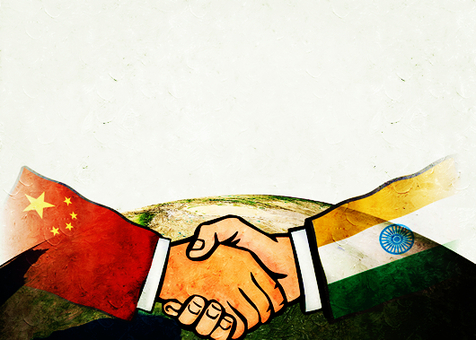President Xi's visit to India
- By Sajjad Malik
 0 Comment(s)
0 Comment(s) Print
Print E-mail China.org.cn, September 17, 2014
E-mail China.org.cn, September 17, 2014
President Xi Jinping is paying a visit to the South Asian countries of the Maldives, Sri Lanka and India this week. A visit to Pakistan was also included in the initial plan, but was scrapped due to the political disturbance caused by opposition protests in front of the parliament building in the heart of the capital, Islamabad. The culmination of this regional trip will be Xi's visit to India, which is his first official trip to China's Asian economic and strategic rival.
|
|
|
The ties between China and India have shown remarkable growth despite lingering territorial disputes and occasional outbursts of patriotic feelings. |
The ties between the two countries have shown remarkable growth despite lingering territorial disputes and occasional outbursts of patriotic feelings. India had a brief border war with China in 1962, and since then its narrative of the big neighbor has been mired in suspicion. Most Indian defense spending and preparedness, including long-range inter-continental missile systems, is directed toward China. It is pertinent to mention that when India wanted to go nuclear in 1998, its then defense minister George Fernandes raised the specter of the Chinese threat. He issued several statements targeting China before conducting underground nuclear experiments, which then promoted rival Pakistan to test its nuclear arsenal in order to create strategic parity with India.
Sino-Indian ties remained stagnant after the 1962 border scuffle in which India suffered a shocking defeat. The thaw came in 1988 when former Indian Prime Minister Rajiv Gandhi visited China, and this improvement continued throughout the 1990s. The first decade of the 21st century saw the first fruits of improved relations as the value of trade ties between the two countries surged upward.
Xi's visit comes as India is transitioning into rule by the Hindu right wing Bharatiya Janata Party and new Prime Minister Narendra Modi, who has no qualms about his fundamentalist credentials. He was accused of turning a blind eye to the killings of hundreds of Muslims in religious riots when he was chief minister of the state of Gujarat in 2002. After winning election this year, he tried to change his profile by inviting regional leaders for his swearing in ceremony in May, but his lack of diplomatic skills became apparent during his recent visit to Japan, when he tried to exploit Sino-Japanese tension by pledging a "new level" of ties with Tokyo. The move was interpreted as shoring up an alliance against China, but Modi's choice of words led some analysts to dub him the "Indian Shinzo Abe." He was overtly expressive when he said that the "expansionist" ideas of the 18th century are still visible in the world and that some countries "encroach" on others, some "enter the seas," and some "capture others' territory." These criticisms unmistakably refer to Beijing's rival claim to a set of Islands in the East China Sea which are under Tokyo's control. China also imposed an air defense zone over the sea last year.







Go to Forum >>0 Comment(s)